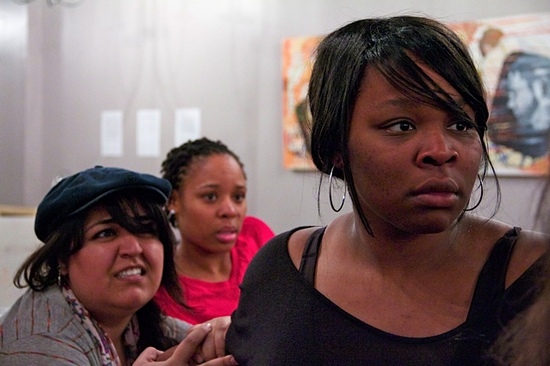| « International Antiques Fair @ Merchandise Mart | Subterranean Experiments » |
Theater Mon Apr 30 2012
Earth Pearl Collective: A 'Streetcar' By A Different Name
Tennessee Williams' Pulitzer Prize-winning play, A Streetcar Named Desire, is indeed one of theater's most classic works; with social issues like culture and class at the heart of the story, it remains a popular, long-time favorite among theatergoers. Here, Iman Crutcher, co-founder and artistic director of Earth Pearl Collective, talks about the organization's adaptation of the play, as well as its mission to promote and enhance theater and performance art among queer women of color.
A Streetcar Named Desire is a classic play--why did you decide to perform it under the Earth Pearl Collective's umbrella?
We knew that we wanted to produce a show that was a classic so that we could merge our audiences. At our Monday variety shows that we do once a month at Hamburger Mary's, we definitely have queer women of color coming out to those performances and we have a lot of issues and things we wanted to bring to the general public's attention as well--we felt like we needed to do something that gets everybody in the same space. When we started thinking of classic plays, Tennessee Williams' [plays] were actually the first ones we picked up and started reading through.
Was there something specific in the play that attracted you or that you wanted to draw particular attention to?
After you read the play, you don't think too much about the domestic violence aspect of it because no one else really makes a big deal of it--but it's huge. I feel like it's a huge part of A Streetcar Named Desire that's glossed over a lot, just like domestic violence in same sex relationships gets glossed over a lot. With domestic violence in same sex relationships people say, "I didn't know that happened." This needs to be talked about and this is the perfect play to do it.
In the Earth Pearl Collective's adaptation, the story is set in Chicago instead of Louisiana--what kind of "Chicago-isms" can the audience look forward to? Also, are there other differences from the original work?
We definitely keep the class differences in; also, we're setting it in 2012. We're setting it in Chicago and the 'streetcar' is the Red Line.
The Red Line--that's definitely Chicago.
Hey--if we're going to make it here [in Chicago], then we're going to make it here. We did do a few edits to make it more modern and to make sure that people in Chicago could connect to it as much as possible. We just changed it a little bit to make it more Chicago-based, with certain restaurant and neighborhood references and things like that.
Are there any other differences in this version?
We deal with the culture clash [aspect] of the original--transgenderism is another thing in the queer community that gets overlooked and these kinds of relationships happen a lot. In our version, we're really trying to tackle all different kinds of relationships in the queer community of color, especially for women.
It seems A Streetcar Named Desire always enjoys homage everywhere; even now, there is a multicultural version of it on Broadway starring actor Blair Underwood.
Yes. One of my mentors told me, "Oh, that's awesome you guys are doing it right at the same time they're doing it on Broadway." And I also didn't realize how many Chicago productions of it were going on--there are like two or three schools doing it. I hope people aren't 'streetcar-ed' out when we open because ours is a completely different version. Hopefully, people will see the "classic" version at one of these other productions and say, "Okay--now that I have the frame of reference, let me go check this one out and see what they're doing with it and see what their spin on it will be."
What do you want audiences to take away from the Earth Pearl Collective's version?
I want people to now be aware that even in same sex relationships, that domestic violence is domestic violence and it's wrong; just because two women are fighting, it doesn't make it a "catfight"--it's real. There are so many women who are dealing with this who don't have a place to go because they are not in a heterosexual relationship; there is no resource for them and that is a problem. More people need to open up their resources, practices, clinics, shelters, or whatever to these queer women and allow them a space to heal like they do for [women in] heterosexual relationships. I also want people to know that queer women have stuff going on, too. We're doing amazing work and have amazing talent out there and we don't want to be pigeonholed [artistically]. It's not like, if people see "lesbian," that it's going to necessarily be this "butch" play. It's about bringing audiences together. Chicago is very segregated and I'm hoping that this show is one that brings people together in the same audience and where they see these same issues and say, "I can relate." I'd like to put on more shows like this to bring these different communities together.
A Streetcar Named Desire runs Thursday, May 3 through Sunday, May 6 at the Athenaeum Theatre, 2936 N. Southport; tickets are $20-$27. For more information and show times, visit the website or call 773-935-6875.









